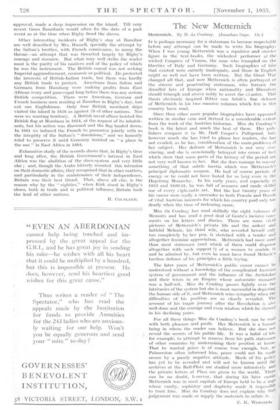The New Metternich .
Metternich. By H. du Coudray. (Jonathan Cape. 15s.) IT is perhaps necessary for a statesman to become respectable before any attempt can be made to write his biography. When I was young Metternich was a repulsive and sinister figure in the text-books, the wickedest performer at the wicked Congress of Vienna, the man who trampled on the liberties of Italy and Germany. Such biographies of hinf that existed were entirely inadequate, and those in Englisli might as well not have been written. But the Great War changed all that, and now Metternich is often portrayed as the sincere and penetrating statesman, who foresaw the dreadful fate of Europe when nationality and liberalism should triumph and strove nobly to avert the chaster. This thesis obviously inspired Ritter von Srbik's fine defence of Metternich in his two massive volumes which few in this country have read.
Since then other more popular biographies have appeared written in similar vein and derived to a considerable extent from the work of the Austrian historian. Miss. du Coudray's book is the latest and much the best of these. Her pub- lishers compare it to Mr. Duff Cooper's Talleyrand, but, however much she has, tried to please her readers, she has • not evaded, as he has, 'consideration of the main problems of her sabject, Her defence of Metternich' is not very Con- vincing, and she is occasionally betrayed into errors of feet which show that some parts of the history of the period are not very well known to her. But she does manage to conveY something of that subtle inertia which was Metternich's 'principal diplomatic weapon. He had of course periods of energy or he could not have lasted for so long even in the Hapsburg Monarchy. In his early years, and especially in 1813 and 1820-21, ho was full of resource and made skilftil use of every dplomatic art. But the last twenty years of his career were really a surrender to both Prussia and Russia of vital Austrian interests for which his cmmtry paid only too dearly when the time of reckoning came.
Miss du, Coudray has used skilfully the eight volumes of Memoirs and has read a good deal of Gentz's incisive com- ments on his letters and diaries. There are some vivid pictureS of Metternich's private life and the ardent and faithful Melanie, his third wife, who revealed herself only too completely by her pen, is sketched with a tender and altogether feminine appreciation. Metternich had more need than most statesmen (and which of them could dispense altogether with such support ?) of a woman to confide in and be admired by, but even he must have found Melanie's tactless defence of his principles a little trying.
The later years of Metternich's public career cannot bn understood without a knowledge of the complicated Austriae system of government and the influence of the Archdukes and their wives in an Empire whose autocratic monarcil • was a half-wit. Miss du Coudray passes lightly over the intricacies of the system but she is most successful in depicting the human side of it, and Metternich wins sympathy when the difficulties of his position arc so clearly revealed. The account of his tragic journey after the Revolution is a1-' well done and the courage and even wisdom: which he dirt' u'l in his declining years.
For all these things Miss du Coudray's book can be rend with both pleasure and profit. Her Metternich is a human being in whom time reader can believe. But she does 'riot reveal the secrets of his public life. It was a habit of hist for example, to 'attempt to remove froM his path statesmen of other countries by undermining their position at home. That he wanted peace is of course true enough, but, .05 Palmerston often informed him, peace could not be mace secure by a purely negative attitude. Much of his pad has . yet to be revealed and will not be known until the archives at the Ball-Platz are studied More intensively and the private letters at Plass are given to the .world. Thefe can be no doubt, however, that during his later carer Metternich was in most capitals of Europe held to be a man whose vanity, sophistry and duplicity made it impossible to trust him. Miss du Coudray does not explain why .00 judgement was made. or supply the materials to refute it..
C. K. WEBSTEnt'


























































 Previous page
Previous page